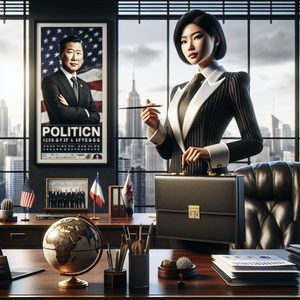Getty's Global Empire: A Multifaceted Legacy

While Getty's initial wealth stemmed from his oil business, his visionary approach led him to explore other lucrative avenues. One of his notable ventures was in the realm of art. Getty had a profound appreciation for art and culture, which prompted him to invest heavily in art collections. His acquisition of priceless works, including paintings by masters like Rembrandt and Van Gogh, positioned him as a significant figure in the art world.
Example: The Getty Museum
This passion for art culminated in the establishment of the Getty Museum in Los Angeles, which houses an extensive collection and serves as a cultural beacon. The museum, founded in 1974, not only showcases Getty’s art collection but also includes a research institute and a conservation center. The institution has played a crucial role in preserving and promoting the arts, making it a vital resource for scholars, artists, and the general public.
Real Estate Investments
Getty also recognized the potential of real estate as a means of wealth accumulation. His investments included prime properties in Beverly Hills and London, which not only appreciated in value over time but also served as lucrative rental properties. By diversifying his portfolio to include real estate, Getty was able to mitigate risks associated with the oil market's volatility.
Example: The Getty Villa
One of his standout real estate investments was the iconic Getty Villa in Malibu, which was originally his private residence. This estate was transformed into a public museum dedicated to ancient art and culture, further solidifying Getty's commitment to the arts while simultaneously increasing his public profile. The villa houses an impressive collection of antiquities, and its architectural design is inspired by ancient Roman villas, reflecting Getty’s passion for classical art and history.
Hollywood Ventures
In addition to art and real estate, Getty ventured into the film industry. His investments in major films and studios reflected his understanding of the entertainment sector's potential for profitability. Getty's involvement in Hollywood not only diversified his financial interests but also allowed him to influence the cinematic landscape.
Example: "The Graduate"
His production company, Getty Oil, financed several projects, including the iconic film "The Graduate," which became a cultural touchstone of the 1960s. This film not only achieved critical acclaim but also highlighted Getty’s ability to identify and support projects that resonated with societal trends. His film investments exemplified his belief in the importance of adaptability in business, allowing him to tap into the burgeoning entertainment industry.
Philanthropy and Cultural Impact
Getty's global empire was not solely focused on profit; he also made substantial contributions to the arts and education. His philanthropic efforts through the Getty Trust aimed at preserving cultural heritage and promoting art education. The Getty Trust supports various initiatives, including the conservation of artworks and funding for art education programs, ensuring that Getty's legacy extends beyond his wealth.
Example: The Getty Trust Initiatives
The Getty Trust has funded numerous projects, including the conservation of significant artworks and the establishment of art education programs in schools. This commitment to philanthropy reflects Getty’s belief that access to art and culture should be available to all, positioning the Getty Trust as an essential player in the global art landscape.
J. Paul Getty's global empire was a testament to his ability to diversify his interests and make strategic investments across various sectors. From art and real estate to film, Getty's ventures not only augmented his wealth but also left an indelible mark on culture and philanthropy. His legacy endures through the Getty Museum and Trust, which continue to enrich lives and promote the arts. As we reflect on Getty's multifaceted contributions, it becomes clear that his story is not just about the accumulation of wealth but also about the impact one individual can have on society through diverse interests and philanthropic endeavors. His life serves as an inspiration for future generations to pursue a multifaceted approach to success, integrating personal passion with a commitment to giving back to the community.
Art Curator
Getty Museum, Museum of Modern Art (MoMA)
Core Responsibilities
Develop and manage art exhibitions, ensuring they align with the institution's mission and vision.
Research and acquire new pieces for the collection, focusing on historical significance and provenance.
Collaborate with artists, collectors, and other institutions to foster partnerships and enhance exhibition offerings.
Required Skills
Strong knowledge of art history and contemporary art trends; a degree in Art History or a related field is often required.
Excellent organizational skills for managing multiple projects and deadlines.
Strong communication and interpersonal skills to engage with artists, donors, and the public.
Common Employers
Art museums, galleries, and cultural institutions like the Getty Museum or the Museum of Modern Art (MoMA).
Real Estate Investment Analyst
Real estate investment trusts (REITs), private equity firms, real estate development companies
Core Responsibilities
Conduct market research and financial analysis to evaluate potential real estate investments and development projects.
Prepare detailed reports and presentations for stakeholders, including risk assessments and investment recommendations.
Collaborate with real estate developers and investment firms to identify new opportunities and trends in the market.
Required Skills
Strong analytical skills with proficiency in financial modeling and real estate valuation techniques.
Knowledge of market trends, property management, and investment strategies; a degree in Finance or Real Estate is preferred.
Proficiency in software such as Microsoft Excel and various real estate analysis tools.
Common Employers
Real estate investment trusts (REITs), private equity firms, and real estate development companies.
Film Producer
Paramount Pictures
Core Responsibilities
Oversee the entire production process of films, from initial concept to final distribution.
Manage budgets, schedules, and project timelines, ensuring that productions stay on track and within financial constraints.
Collaborate with directors, writers, and other creative professionals to develop scripts and storylines that resonate with audiences.
Required Skills
Strong leadership and project management skills; experience in film production or a related field is essential.
Excellent networking abilities to build relationships within the film industry and secure financing for projects.
Familiarity with film editing software and production tools.
Common Employers
Film production companies, studios like Paramount Pictures, and independent film organizations.
Philanthropy Coordinator
Getty Trust
Core Responsibilities
Develop and manage philanthropic initiatives and programs that align with the organization's mission and goals.
Build relationships with donors, stakeholders, and community organizations to secure funding and support for projects.
Monitor and evaluate the impact of funded programs, reporting back to stakeholders on outcomes and future needs.
Required Skills
Strong communication and interpersonal skills for effective engagement with various stakeholders.
Experience in grant writing and fundraising techniques; a degree in Nonprofit Management or a related field is advantageous.
Knowledge of budgeting and financial management in a nonprofit context.
Common Employers
Nonprofit organizations, foundations, and cultural institutions like the Getty Trust.
Conservation Scientist
Museums, art galleries, historical preservation organizations
Core Responsibilities
Assess and analyze artworks and artifacts to determine the best methods for preservation and restoration.
Conduct scientific research to develop new techniques and materials for art conservation.
Collaborate with curators and museum staff to implement conservation strategies that protect collections.
Required Skills
Strong background in chemistry or materials science; a degree in Conservation Science or a related field is essential.
Attention to detail and problem-solving skills to address complex conservation challenges.
Experience with laboratory techniques and tools used in art conservation.
Common Employers
Museums, art galleries, and historical preservation organizations.


